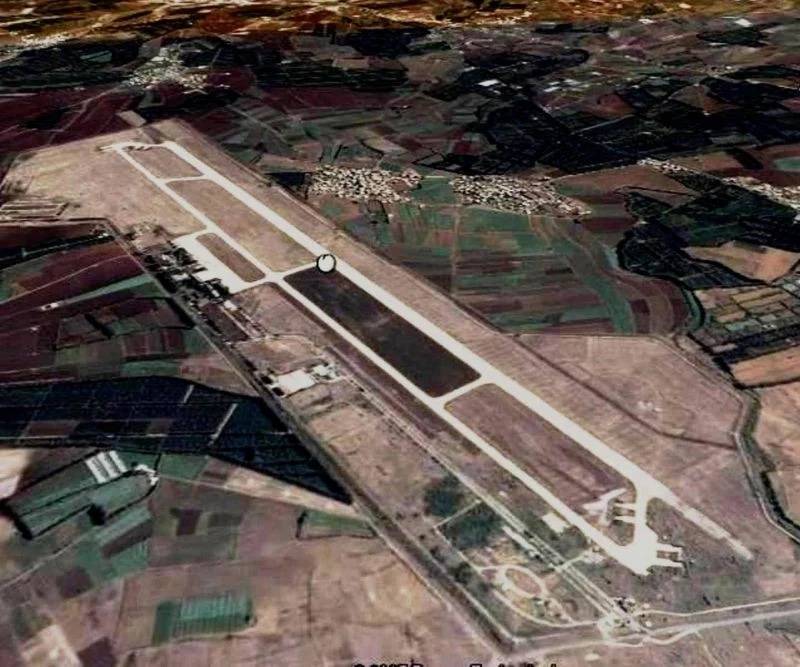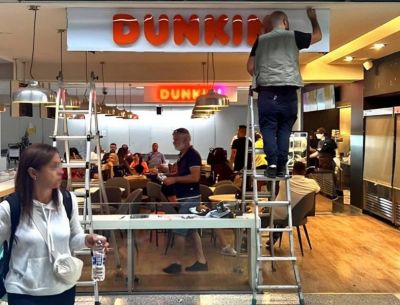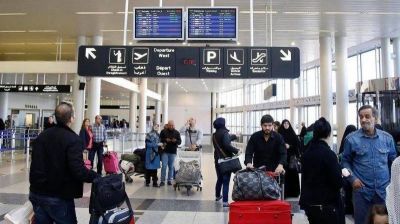
Aerial view of Qlayaat airport. (Credit: Michel Hallak)
In the midst of Lebanon’s deepening economic and political crisis, the notion of rehabilitating Qlayaat airport may appear illusory. However, members of the National Moderation parliamentary bloc, including representatives from the North who are affiliated with former-Prime Minister Saad Hariri’s Future Movement, hold a different view.
These MPs have granted caretaker Prime Minister Najib Mikati, who himself hails from Tripoli, the capital of North Lebanon, a two-month timeframe to initiate the airport’s restoration project.
Qlayaat airport, situated in Akkar and currently utilized by the army, is perceived as a significant economic opportunity for marginalized areas.
The reopening of this airport, which would serve as the country’s second, cannot be perceived separately from the prevailing political polarization in the country.
In the current landscape, where terms like federalism, autonomy and separation are resurfacing, it becomes intertwined with the political dynamics at play.
‘Akkar’s oil’
“We had a discussion with the prime minister regarding the rehabilitation of Qlayaat airport, and he showed considerable receptiveness,” Sajih Attieh, an MP for Akkar, member of the National Moderation bloc, and chairman of the Parliamentary Committee for Public Works and Transport, told L’Orient-Le Jour.
Attieh added, “In order to urge him to take this matter seriously, we have set a two-month deadline for him to initiate the necessary actions. Should he fail to do so, we will resort to mobilizing popular pressure.”
Often referred to as “Akkar’s oil,” the rehabilitation of Qlayaat Airport is a crucial demand of the residents of the underprivileged areas in Northern Lebanon. They hold hope that the airport’s development will generate employment opportunities and foster economic growth.
For his part, Ashraf Rifi, MP for Tripoli, said, “The reactivation of this airport would be highly beneficial for the entire North, particularly Tripoli.”
Rifi holds hope that such a step would pave the way for the implementation of other developmental initiatives in the city, such as the establishment of a special economic zone.
Rifi is affiliated with the Renewal bloc and shares a close association with Michel Moawad, MP representing Zgharta.
It is worth noting that the Qlayaat airport bears the name of Moawad’s late father, i.e., René Mouawad, who was elected president in 1989 but was tragically assassinated a few days later.
Since its closure in the 1990s, numerous political figures have consistently advocated for the reactivation of the Qlayaat Airport at the earliest opportunity. Various ministers of public works and transport have expressed their support for the project over the years.
However, despite periods of economic boom fueled by reconstruction and tourism, the project failed to materialize due to a lack of political will.
According to Albert Kostanian, an economic expert and director of the think tank Kulluna Irada, “Hezbollah shows little enthusiasm for the idea of an airport at Qlayaat.”
This project would undermine the party’s monopoly at the Beirut international airport, situated in the southern suburbs of the capital, an area controlled by Hezbollah.
Kostanian further highlighted that the party exerts significant influence over the airport and reaps “major political benefits” from it.
Monopoly
In 2008, during Fouad Siniora’s government, Wafic Choucair, who had close ties to Hezbollah, was dismissed from his position as the head of security at the Beirut airport.
This decision was made following the disclosure of a security vulnerability at the airport by Progressive Socialist Party (PSP) leader Walid Joumblatt.
Furthermore, Joumblatt launched a campaign against the illicit telecommunications networks operated by Hezbollah. In response, Hezbollah militants took control of parts of the capital and the Druze Mountain, exerting pressure on the government to reverse its decisions.
“If the security situation in Lebanon continues to deteriorate, Hezbollah holds a strategic interest in maintaining a monopoly over air transportation,” Rifi said.
Rifi was referring to a recent incident in northern Lebanon, where two individuals from the predominantly Christian village of Bsharri died during a dispute with the neighboring Sunni-majority village of Bqaa Safrin over a water source.
Certain opposition members allege that Hezbollah played a role in the incident, which had the potential to escalate into a religious confrontation. The party denies any involvement in the matter.
Attieh said that discussions about the airport project took place with Hezbollah MPs and they expressed receptiveness toward it.
MP Hussein Jashi, a Hezbollah member, told L’Orient-Le Jour that politics and economics should not be mixed. He emphasized the need to assess the project’s costs and benefits, underscoring his concern for the welfare of fellow citizens in the north.
While some question the necessity of a second airport in Lebanon, Kostanian argued that having a backup facility is crucial for any country. In the event of damage, natural disasters or political instability affecting the primary airport, a secondary airport becomes vital.
Kostanian added that studies need to be conducted to determine the specific details and figures. However, he believes that a second airport would introduce competition and enhance the performance of Beirut airport. In terms of financing, Kostanian suggested following a public-private partnership model, with the private sector shouldering the costs.
“Lebanon stands out in its tendency for the state to assume responsibility for everything,” he said.
This article was originally published in French in L'Orient-Le Jour. Translation by Sahar Ghoussoub.

